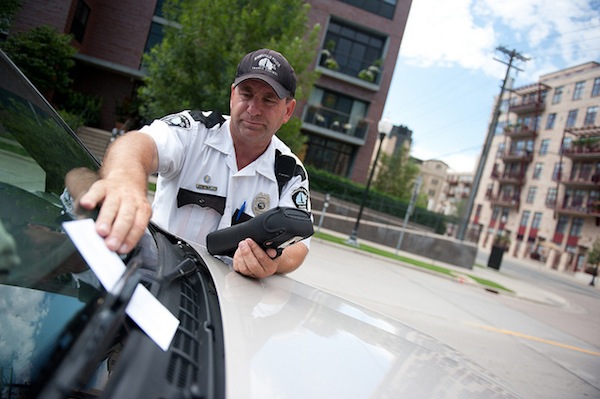
There’s a familiar dance any time a newspaper makes a records request to local government. Step 1: Said governmental body says records will cost an exorbitant amount. Step 2: Newspaper counters with the public’s right to know. Step 3: Governmental body slightly lowers the cost of the records request. Step 4: Repeat until parties reach a terse agreement, abandon the story, or go to court.
This is business as usual for newspapers; most newsrooms have a budget specifically for records requests, but that doesn’t mean reporters don’t want to cut the best deal possible, for reasons both journalistic (the public needs to know) and financial (the paper’s budget is shrinking).
The Columbia Missourian is taking a different tack: raising the money outside the newsroom. The paper, staffed in part by students at the University of Missouri School of Journalism, has used Spot.us to scare up the funds for records for two separate cases, the most recent being an investigation into parking tickets. In the span of 24 hours last week they raised $500, to get a copy of the city’s parking ticket database for a story on trends in enforcement.
Now Missourian reporter (and Mizzou grad student) Joe Yerardi gets the fun job of parsing through the data and seeing what stories it yields. When I spoke to Yerardi, he said Spot.us made sense because time was of the essence. That’s always the case when a reporter is working on a story, but because of the transitory nature of a paper like The Missourian (students work semesters at a time), there was even less time to haggle over the cost of the data. “Come mid-December, I’m no longer a reporter here,” he said. “This is not something I can spend months and months or a year working on.”
That’s not to say there wasn’t plenty to argue about on The Missourian’s end. In its justification for the records’ cost, the city of Columbia explained it no longer had a working contract with the vendor that maintains the parking database, which would make the city’s claim to limiting access or exempting parts of the records odd, to say the least. “It bothers me that some people who are in charge of public records view their job as less of an intermediary between the public and these records and more as a gatekeeper, someone who is unwilling to do much at all to facilitate open government,” he said.
While $500 is not a large amount of money, it’s enough to make a dent on the paper’s budget, Tom Warhover, executive editor of The Missourian, told me. Though The Missourian is tied to the university, its budgeting is not that different from other community newspapers, and in that way Warhover suspects their situation is similar to community papers around the country. This is the second time the paper has used Spot.us to fund a records request, the first coming last December when they requested data for a story about liquor violations on the University of Missouri campus. They similarly raised the money overnight — $100 in that case — to ply the records away from the university. The stars seemed to align for the project: At the time Spot.us founder David Cohn was studying at the Reynolds Journalism Institute.
There’s an undeniable awkwardness that comes from the idea of a newspaper, usually for-profit enterprises, asking people for money. It’s worth noting that $150 of the $500 came from The Missourian itself, and that many of the other donations came through credits earned by users taking a survey rather than straight-up cash.
In the case of The Missourian, it helps that they’re not only a nonprofit, but also a laboratory of sorts, the equivalent of a teaching hospital for journalism. Everything The Missourian does has dual goals: serving the news needs of the community while providing practical experience to student journalists, Warhover said. Spot.us helped do both in this case. The lesson is that records requests will always be tricky and in times of tightening budgets that requires creative thinking, Warhover said. “For us, it’s a way to leverage more funds to get more sunshine requests,” he said. “It’s as simple and as powerful as that.”
Image by Danny Guy used under a Creative Commons license.